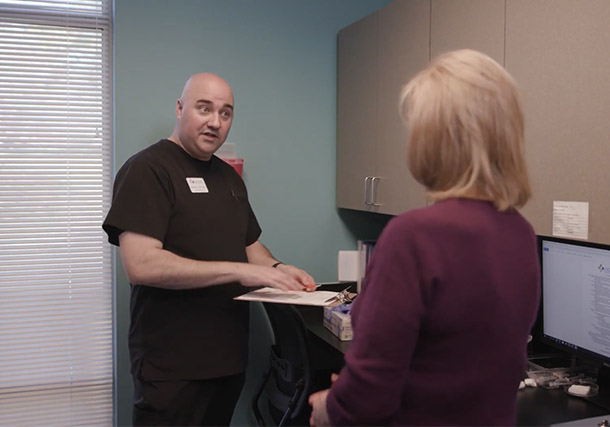
COPD Treatment in Charlotte
COPD can be a frustrating and difficult condition for many individuals, as it may interfere with your daily life and activities. At Carolina Asthma & Allergy Center, we understand the impact that COPD can have on your lifestyle and well-being, and we are committed to providing comprehensive care to help manage and treat this condition.
Our team of board-certified allergists and experienced healthcare professionals is dedicated to providing personalized treatment plans and ongoing support to help you live your life to the fullest. Whether you are seeking a diagnosis, treatment, or ongoing management of your COPD so you can find relief from your symptoms, we are here to help you every step of the way.
How to Request an Appointment
At Carolina Asthma and Allergy Center, we offer comprehensive evaluation and treatment for your COPD. If you suspect you may have COPD or have experienced irritation in your lungs, you can request an appointment with our team of board-certified allergists and experienced healthcare professionals.
To schedule an appointment, you can call our office or fill out the online appointment request form on our website. Our friendly staff will work with you to find a convenient date and time for your visit.
During your appointment, our allergists will review your medical history, perform a physical exam, and conduct any necessary tests to determine if you have COPD. Based on your evaluation, our team will develop a personalized treatment plan to help manage your symptoms.
What is COPD?
Chronic Obstructive Pulmonary Disease (COPD) occurs when the lungs are exposed to irritants and become inflamed, narrowing the air passages, and making breathing difficult. The most common irritant responsible for COPD is cigarette smoke, which results in 85-90% of cases.
Over time, lungs that are exposed to irritants lose important elasticity for proper breathing, resulting in symptoms such as shortness of breath, wheezing, and coughing. These symptoms get progressively worse without treatment. In addition, COPD can lead to more serious complications, including lung cancer, heart disease, and depression.

Types of COPD
There are three types of COPD, depending on what area of the lungs is damaged.
- Emphysema: Damage to the air sacs causes the small airways to collapse.
- Chronic bronchitis: Inflammation of the airways leads to narrowed tubes and mucus blockage.
- Refractory asthma: Also known as Asthma-COPD Overlap Syndrome (ACOS), this occurs when both asthma and COPD are diagnosed, resulting in more severe symptoms.
In all cases, inflammation of the lungs gets worse without treatment, making symptoms more severe. Regardless of the type of COPD, symptoms are the same in nature.
What are the Symptoms of COPD?
COPD symptoms typically don’t emerge until lung damage is significant. This can make early diagnosis and treatment difficult. Over time, these symptoms will get progressively worse, especially if smoking continues:
- Shortness of breath
- Wheezing
- Persistent cough, especially with lots of mucus
- Chest tightness
- Frequent respiratory infections
- Blue-tinged fingernails
- Low energy levels
- Swollen ankles, feet or legs
- Unintentional weight loss
In addition, those with COPD may experience exacerbations, when symptoms become more severe than usual for a few days. These episodes may get worse without proper diagnosis and treatment.
What are the Causes & Risk Factors for COPD?
In the majority of cases, COPD is caused by cigarette smoke. The longer you’ve smoked, the greater your risk for COPD. This also includes other types of smoking such as pipe, cigar, and marijuana smoke.
Exposure to secondhand smoke can also result in COPD symptoms, so it’s important to try and create a smoke-free home for your family members.
In addition, other irritants can put you at risk for COPD including:
- Workplace exposure to fumes, vapors, dust, and smoke
- Household fumes, including from cooking fires and poorly ventilated homes
- Air pollution
In rare cases, COPD can also rise from a genetic condition called Alpha-1 deficiency, which makes the lungs vulnerable to damage.
It’s also important to note that certain medical conditions may increase your risk of COPD, including a history of asthma or respiratory infections.
Finally, female smokers may have a higher risk of getting COPD because it’s commonly misdiagnosed in women. For this reason, it’s especially important for women with these symptoms to consult with an expert allergist.
How is COPD Diagnosed?
To diagnose COPD, an allergist will discuss your symptoms and medical history, as well as your exposure to potential irritants. In particular, you’ll be asked if you currently smoke or have smoked in the past.
Next, you’ll typically undergo a spirometry test. Spirometry checks your lung function by measuring your airflow. Essentially, you blow air into a mouthpiece, which is attached by tubes to a small machine. The machine measures how much air and how fast you’re capable of blowing.
In addition, a doctor might perform tests to rule out other conditions, including X-rays, CT scans, arterial blood gas tests, and lab tests.
COPD Treatment in Charlotte
While there’s no cure for COPD, it can be managed in order to slow down symptoms. Typically, the first recommendation is to stop smoking. It’s the most effective way to reduce COPD complications, which is why you’ll likely be referred to a tobacco cessation program.
Other treatments are also available, including:
- Inhalers
- Medications, such as bronchodilators and steroids
- Antibiotics to treat respiratory infections
- Oxygen therapy
- Pulmonary rehabilitation
- Surgery or a lung transplant
In addition, your allergist will discuss management techniques to prevent exacerbations from occurring. This may include avoiding exposure, keeping up healthy habits, getting an annual flu vaccination, and using a range of medications. Also, you may be referred to a pulmonologist for additional COPD care & treatment since they focus more on this.
Summary
At Carolina Asthma and Allergy Center, we are dedicated to providing compassionate care and ongoing support to help you live your life to the fullest. Contact us today to request an appointment and take the first step towards managing your COPD.
COPD FAQs
Are there any complications related to COPD?
Yes. Due to lung damage, COPD complications typically impact the lung and heart. These complications can be life-threatening, including:
- Severe respiratory infections
- Lung cancer
- Heart disease and heart attack
- High blood pressure
- Depression
Because these complications can put your life at risk, it’s vital to start treatment to slow down symptoms.



